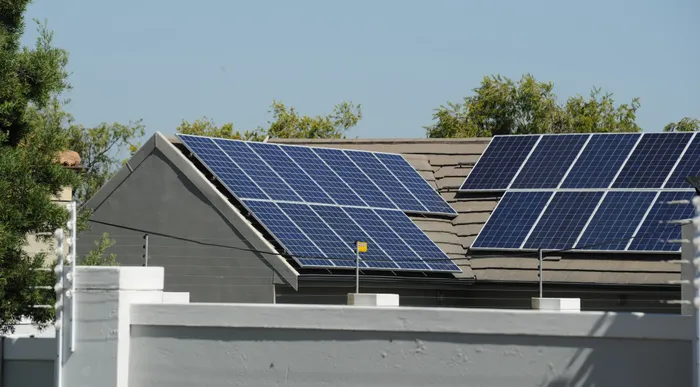Eskom’s solar clampdown: A risk to renewables and business confidence
SOLAR

As commercial and industrial businesses increasingly turn to renewables to escape erratic power supply, these new requirements raise serious questions about legality, cost, and Eskom’s role in shaping South Africa’s energy future.
Image: Henk Kruger/Independent Newspapers
Eskom’s latest push to enforce registration for all grid-tied solar systems, even those that don’t feed into the grid, has sent shockwaves through South Africa’s solar sector.
As commercial and industrial businesses increasingly turn to renewables to escape erratic power supply, these new requirements raise serious questions about legality, cost, and Eskom’s role in shaping South Africa’s energy future.
Eskom’s registration mandate
Eskom recently intensified efforts to ensure all grid-tied solar power systems are registered, regardless of whether they feed electricity back into the grid.
The power utility claims this move is primarily about safety, citing the need to maintain network integrity and referencing standards such as NRS 097-2-3 and the South African Distribution Code to manage power flow and mitigate risk.
Yet, this approach has been met with criticism. Industry experts, including energy analyst Chris Yelland, have raised questions about the legality of some of Eskom’s mandates.
Eskom’s insistence that solar installations require sign-off by the Engineering Council of South Africa (ECSA) - registered personnel has sparked widespread backlash across the solar industry.
This requirement substantially increases costs for businesses, with certification alone ranging from R10,000 to R20,000 or more, depending on the system size.
Legal and regulatory clarity
Civil rights group AfriForum has formally challenged Eskom’s stance, demanding transparency about the legal grounds on which it enforces these requirements.
They argue that Eskom has yet to specify the regulations that empower it to enforce mandatory registration and associated fees, implying that Eskom’s current approach might lack legal enforceability.
Indeed, while Eskom has referred broadly to regulations from the National Energy Regulator of South Africa (NERSA), they have not provided specific legislative backing for compulsory registration of solar installations below 100kW. This ambiguity has sparked uncertainty among businesses investing in renewable energy.
Cost concerns and practical implications
The cost burden of compliance is another significant point of contention. Eskom’s registration fees, combined with the necessity of installing smart meters, have been reported to range between R30,000 and R50,000.
Industry expert Professor Vally Padayachee has indicated that some of these figures might be exaggerated, but confirmed that costs remain substantial, especially for larger commercial installations.
This has led to speculation that Eskom’s registration strategy could unintentionally drive businesses away from grid connectivity entirely. If faced with high registration and compliance fees, businesses might prefer to reinvest these funds into expanding their solar and battery storage capacities, achieving complete energy independence from Eskom.
Divergent approaches: Eskom vs Municipalities
A further complication lies in the inconsistent approaches between Eskom and municipal electricity suppliers. While Eskom is enforcing strict registration requirements and high compliance costs, many municipalities have opted for more pragmatic, business-friendly policies, often waiving hefty fees and reducing red tape.
This policy fragmentation is not just confusing - it’s potentially damaging. A business installing solar in one part of Sandton (served by Eskom) could face R50,000 in compliance costs, while a neighbouring business down the road (served by City Power) might pay nothing at all. The result is a lopsided playing field that deters investment in Eskom areas, distorts competition, and undermines national renewable energy efforts.
Without a unified national framework, South Africa risks creating a patchwork energy economy - where access to clean, affordable power depends not on national strategy, but on municipal boundaries.
The role of professional solar installers
Amidst these regulatory uncertainties, for businesses navigating this uncertainty, working with experienced providers like IMPOWER is no longer optional - it’s essential.
We manage the red tape so clients can focus on what really matters: energy security and ROI. Companies like IMPOWER handle all aspects of solar installation, including navigating Eskom’s complex registration process.
By entrusting solar projects to expert installers, businesses can ensure compliance with all existing requirements, streamline processes, and mitigate risk.
Eskom’s current solar registration policy is not only legally ambiguous and financially burdensome - it risks undermining the very shift to renewable energy that South Africa so urgently needs. If businesses are penalised for investing in cleaner, more reliable energy solutions, the long-term effect will be reduced confidence, stalled projects, and greater energy insecurity.
To unlock the full potential of solar, we need clarity, consistency, and collaboration. Eskom must urgently provide a transparent legal framework for its registration requirements and revisit the cost implications for businesses. Aligning with national energy goals means making it easier, not harder, for companies to embrace renewables.
In the meantime, businesses would be wise to partner with experienced solar providers like IMPOWER who understand the complexities of this evolving landscape. With the right support, South Africa’s energy transition can still be bold, inclusive, and unstoppable.
Matthew Cruise is the business development executive at IMPOWER.

Matthew Cruise, Business Development Executive at IMPOWER.
Image: Supplied.
BUSINESS REPORT